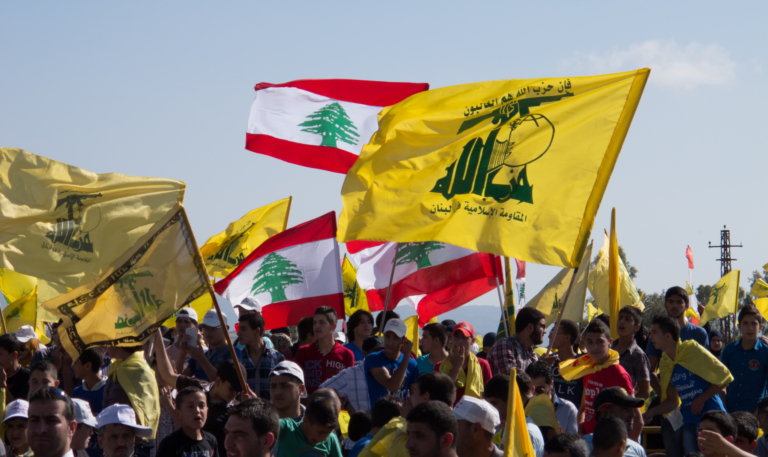
With a heightened risk of the Gaza war spilling over into Lebanon, currently mired in acute political, economic, and social crises, the country’s politicians vehemently oppose opening a front against Israel. Caretaker Prime Minister Najib Mikati, among others, has been clamoring about the need to avoid a war that is “in no one’s interest.” So when Hezbollah Secretary General Hassan Nasrallah in his much-anticipated November 3 address called for a ceasefire in Gaza instead of broader escalation with Israel, relief was palpable among the public. They are fully cognizant that Hezbollah, the Party of God—the actor with the most sway over Lebanese politics today—and not the government would be the one to ultimately make that decision. Nasrallah nevertheless reassured his base, which strongly supports the Palestinian cause, that “all options [remain] on the table.” The movement is already engaged in confrontation through daily combat with Israel at the border. If Israel’s aggression against Gaza continues, Lebanon’s internal situation is likely to intensify and a full-blown war may be inevitable.
Lebanon today is caught between a rock and a hard place. On the one hand, it is at the mercy of Hezbollah, whose raison d’être derives from its resistance against Israel’s 1985-2000 occupation of parts of southern Lebanon; the group uses its fight against that past and any future occupation to justify retaining and deploying a military force independent of the state. On the other hand, Lebanon risks becoming a casualty of those Israelis who increasingly believe that defeating Hezbollah will restore their sense of security and who in recent weeks have intensified rhetoric against Hezbollah and demanded its retreat from the border. Israeli Prime Minister Benjamin Netanyahu has threatened to turn Beirut into Gaza if Israel is provoked, while National Security Advisor Tzachi Hanegbi said that Israel cannot accept Hezbollah fighters on the border, where they face some 100,000 Israeli troops. Still, sentiment in Lebanon remains opposed to a war with Israel because of its certain deleterious effects on the already fragile country.
Internal Responses to the Possibility of War
Political leaders from all fronts have openly opposed a new war with Israel that Lebanon can ill afford. Free Patriotic Movement leader Gebran Bassil, who traditionally is allied with Hezbollah, declared that “all Lebanese people agree that they don’t want war.” The most vociferous opposition has come from the Lebanese Forces Party (LF), which rejects Hezbollah’s making decisions that affect the whole country. The LF has warned the party not to drag Lebanon into a destructive war that it cannot afford and called on the government to take protective measures. LF leader Samir Geagea vehemently criticized the announcement of Hamas’s creation of a fighting unit in Lebanon as a challenge to the country’s sovereignty. The LF also asserted that in light of Lebanon’s dire economic situation, it is Hezbollah’s responsibility to pay for damages caused by the latest skirmishes in the south, estimated at $10 million. This position is at odds with the rest of the opposition, which has insisted that the state handle the needs of citizens in order to avoid bolstering Hezbollah’s position in the area.
Druze leader and former Progressive Socialist Party president Walid Joumblatt cautioned against Lebanon being drawn into a confrontation with Israel, while insisting that Israel, the United States, and Iran are the ones who control the tempo of conflict. Hezbollah ally Nabih Berri, Speaker of Parliament and leader of the Shia Amal Movement, said that Lebanon has the right to defend itself against Israeli attacks, although he demurred on the need to join the current conflict. Berri is in an untenable position as a representative of large constituencies in southern Lebanon, as Hezbollah’s ally, and as an interlocutor between the party and local, regional, and international emissaries trying to curb the Party of God’s daily skirmishes with Israel.
Berri is in an untenable position as a representative of large constituencies in southern Lebanon, as Hezbollah’s ally, and as an interlocutor between the party and local, regional, and international emissaries trying to curb the Party of God’s daily skirmishes with Israel.
Other political figures and parties have voiced their opposition to joining Hamas’s war with Israel. Speaking from long experience, former Sunni Prime Minister Fuad Siniora—who was premier during the 2006 Hezbollah-Israel war—said that although he sympathized with the plight of Gazans, Lebanon simply cannot take another war with Israel. The Kataeb Party, a mainly Christian organization, issued a communique early on in the war cautioning “against dragging Lebanon into the ongoing clashes in Gaza” and warning about “any reckless move [that] will have consequences that Lebanon…cannot afford to bear.” Reflecting the opinion of his “change coalition” colleagues in parliament, lawmaker Mark Daou said that Hezbollah has no excuse to go to war with Israel, even though he and others are strong supporters of Palestinians’ right to self-determination.
Despite widespread public opposition to Israeli actions in Gaza, the Palestinian question (and Hezbollah’s connection to it) elicits mixed reactions in Lebanon, underscoring deep fissures within society about the Palestinians’ presence inside Lebanon. These divides date to the 1975-1990 civil war and the fraught Palestinian armed presence in Lebanon that helped to trigger it. Since its creation in the early 1980s, Hezbollah has defined itself as Lebanon’s guardian, as Israel’s enemy, and as a fierce advocate of Palestinian statehood. Its success in helping to oust Israel from the south in 2000 and its survival of Israel’s 2006 operation transformed it from a movement safeguarding Lebanon’s disenfranchised Shia into a formidable national force. Hezbollah continues to draw legitimacy from resistance operations at the border and in the Shebaa Farms (a remote mountain strip occupied by Israel but claimed by Lebanon), even though a sizable number of Lebanese consider Hezbollah an Iranian proxy rather than a legitimate resistance movement against Israel.
Before October 7, the resistance narrative that has fueled Hezbollah became a focus of renewed contention in Lebanon, but since then protests in solidarity with Palestinians and against Western governments’ support for Israel have revitalized it.
Before October 7, the resistance narrative that has fueled Hezbollah became a focus of renewed contention in Lebanon, but since then protests in solidarity with Palestinians and against Western governments’ support for Israel have revitalized it. The loss of a good number of the party’s militants since October 7 has also boosted Hezbollah’s authority and legitimacy. Its current position against Israel has also convinced the Sunni Islamist, Muslim Brotherhood offshoot al-Jamaa al-Islamiyya Party—that is normally against Hezbollah—to join it in fighting Israel. Despite its hardline supporters’ criticism of its restraint, all in all Hezbollah’s pragmatic and seemingly principled stance has won it allies even among those who do not share its ideology.
The Potentially Devastating Impact of War on Lebanon
Lebanon’s economy has already taken a hit since October 7. The restaurant business has shrunk and tourism, a key engine of economic growth, has dropped. (The national carrier Middle East Airlines has reduced operations by some 80 percent due to the rising instability.) The population has been in a wait-and-see mode as the conflict continues to unfold. Lebanon is grappling with widespread unemployment, devaluation of the currency by more than 98 percent, and one of the highest debt-to-GDP ratios in the world at 283.2 percent. Almost 80 percent of Lebanese have been pushed into multidimensional poverty. In the 2006 war with Israel the situation was vastly different, as the country then had a functioning banking sector and financial system that was able to rebound. At that time Lebanon also benefited from the support of Gulf allies such as Saudi Arabia and Kuwait that deposited $2.5 billion in the Central Bank between 2006 and 2008 to help fund reconstruction. Today, Saudi Arabia and indeed most Gulf states have nearly ended their financial assistance to Lebanon.
During the 2006 war, Israeli warplanes targeting Hezbollah bases and national infrastructure disabled the Beirut airport and two smaller ones, destroyed some 100 roads and 70 bridges, and hit Lebanon’s three main seaports. The onslaught destroyed civilian areas and internally displaced an estimated one million Lebanese. The damage to Lebanon’s infrastructure was estimated at $3.5 billion. This was in addition to the economic cost of reduced tourism, limited food supplies due to Israel’s air and sea blockade, and reduced electricity provision. Because of damage to power stations, an estimated 750,000 Lebanese in the south were left entirely without electricity. Lebanon took years to rebuild after the war.
As voices inside Israel intensify their warmongering, all talk in Lebanon about ending the political paralysis—a caretaker government has been running the country since 2022—has been tabled.
As voices inside Israel intensify their warmongering, all talk in Lebanon about ending the political paralysis—a caretaker government has been running the country since November 2022—has been tabled. The International Monetary Fund (IMF) had promised a $3 billion rescue package in 2022, pending needed reforms to address endemic corruption and general malfeasance. But instead of functioning as a well-intentioned government in such dire circumstances and securing the IMF package, Lebanon’s politicians have stalled reforms to restructure the banking sector, introduce fiscal changes, and improve governance and transparency. Indeed, they have engaged in the usual blame game, propagating extensive disinformation to justify delays that have led to never-ending crises.
The More Things Change, the More they Stay the Same
Still, while nobody in Lebanon wants a war, the country may not be able to prevent one. The scale of the October 7 Hamas attack could define Lebanon’s future, compelling Hezbollah to join in Hamas’s fight and dealing a catastrophic blow to the country. But Israel may also take it upon itself to attack Lebanon without waiting for Hezbollah. Indeed, the idea of a preventative strike is gaining momentum as Israelis want to stamp out the daily threat of attacks from an adversary on the northern border that is more formidable than Hamas. Whatever Hezbollah’s or Israel’s next moves are, an escalation of the current low-intensity conflict into a full-scale war will push Lebanon into even worse social and economic conditions—even as its irresponsible and corrupt politicians continue to sabotage any possibility of recovery and reform at the public’s expense.
Whatever Hezbollah’s or Israel’s next moves are, an escalation of the current low-intensity conflict into a full-scale war will push Lebanon into even worse social and economic conditions.
More than anything, the current situation has underscored the dangerous ability of the Lebanese to normalize an extremely risky situation on the border with Israel. Politicians also may convince themselves that, even in abnormal circumstances, the “normal” modes of political life—bickering, playing the blame game, jockeying for position, engaging in petty corruption—constitute an acceptable and effective governance style. Thus, developments between Hezbollah and Israel call for caution because the next phase and its ensuing uncertainties may further sink Lebanon’s economy and dramatically worsen living conditions, irreversibly precipitating the complete collapse of the country.
The views expressed in this publication are the author’s own and do not necessarily reflect the position of Arab Center Washington DC, its staff, or its Board of Directors.

